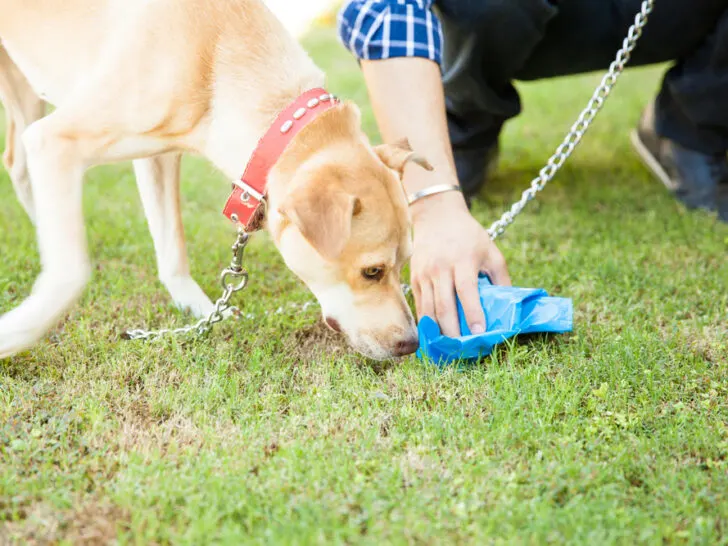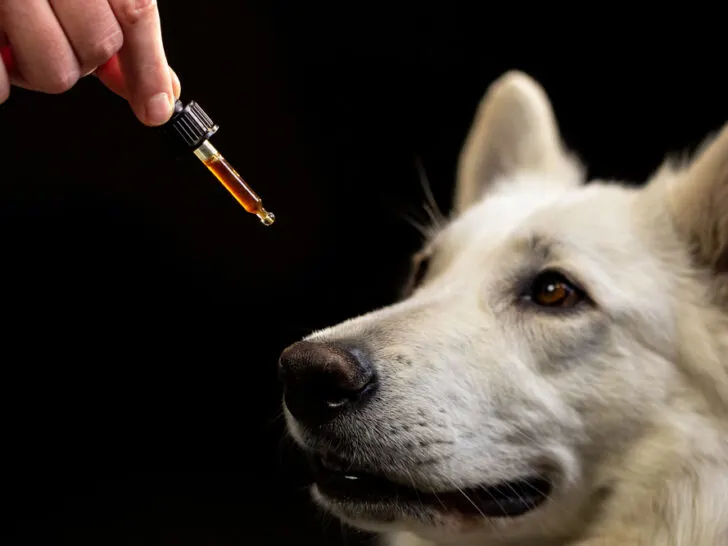Medically Reviewed by Dr. Majid Tanveer, DVM
It can be a challenge for both of you when your pup is enduring diarrhea. However, understanding the causes and being informed about treatments and preventive measures can make caring for them much more manageable.
Drawing from my years of expertise in pet ownership and veterinary medicine, I am here to assist you with providing the most appropriate care for your beloved dogs while they struggle with diarrhea.
Diarrhea in dogs can be caused by various issues such as dietary changes, intestinal parasites, bacterial infections, and more. That’s why it is critical to identify the cause before beginning any treatment. The right type of diet and good hygiene habits are vital in preventing or managing this condition. Furthermore, your veterinarian may prescribe medications to address dog diarrhea once correctly diagnosed.
Let’s look at the causes, treatments, and preventive measures for dog diarrhea.
Overview Of Diarrhea in Dogs

Diarrhea is the frequent passage of loose, watery stools containing mucus, blood, or pus. This often occurs due to ingesting something indigestible or an irritant for the gastrointestinal tract causing inflammation and irritation and leading to excess liquid production in the intestine.
When puppies are young, their digestive systems may still develop; thus, loose stools could occur. Nevertheless, if your diarrhea continues for more than a day without medical care, it can cause rapid dehydration or severe weight loss; therefore, you must seek professional help immediately.
10 Common Causes of Dog Diarrhea

There are many causes for canine diarrhea, and it is essential to determine the underlying cause to provide your furry friend with appropriate treatment. Some of the most common causes include:
1. Dietary Indiscretion
One of the most common causes of dog diarrhea is eating something they shouldn’t have. Even if your pup seems to be an expert at snatching up anything and everything, it doesn’t mean that its digestive system can handle it.
Eating items such as garbage, spoiled food, or even human foods can all cause canine diarrhea.
2. Infections
Dog diarrhea caused by an infection commonly accompanies other troubling symptoms such as vomiting, fever, lethargy, and lack of appetite. Ingested viruses, bacteria, protozoa, or parasites are usually contributing to these infections.
Bacterial Infections
Unsanitary food or water contaminated with animal waste often contains dangerous bacteria capable of causing tremendous abdominal distress.
Some of the most common culprits are:
- E. coli
- Campylobacter
- Clostridium perfringens
- Salmonella
Viral dog diarrhea is often the result of parvovirus, which can cause severe dehydration and even death. Other viral culprits include:
- Canine Distemper virus
- Herpesvirus
- Coronavirus
- Rotavirus
Protozoan Infections
Protozoans are single-celled organisms that can cause digestive issues in dogs. Common protozoans causing dog diarrhea include:
- Giardia
- Cryptosporidium
- Toxoplasma gondii
Parasitic Infections
Intestinal parasites, or worms, enter your pet’s body through contaminated food or water and usually cause bloody diarrhea with mucus. The most common types are:
- Roundworms
- Tapeworms
- Whipworms
- Hookworms
3. Organ Dysfunction
Organ dysfunction is one of the most common causes of dog diarrhea. Major organs, such as the liver, kidneys, pancreas, and intestines, can become impaired, resulting in gastrointestinal distress.
When these organs cease to function properly, it can affect digestion and absorption of nutrients in your pet’s food, leading to unpleasant symptoms such as watery stools.
4. Dietary Intolerance or Allergy
If your furry friend consumes foods that are not suited for their system – whether due to intolerance or allergy – digestive issues may arise, from loose stools to full-on diarrhea.
Grains, dairy products, beef, chicken, eggs, fish, and soy are typical culprits of this uncomfortable state.
5. Toxin Ingestion
Dogs are often drawn to toxic substances, such as antifreeze, plant fertilizer, rat poison, or other chemicals. All these can cause severe gastrointestinal upset, leading to diarrhea in dogs.
6. Inflammatory Bowel Disease (IBD)
Inflammatory Bowel Disease (IBD) is a condition that can manifest in dogs as persistent diarrhea. When the intestines become irritated and inflamed, it interferes with normal digestion.
It leads to bouts of vomiting, weight loss, and, unfortunately, severe chronic diarrhea for your pup. Stressful events such as relocation or dietary changes may trigger IBD.
7. Reactions to Drugs or Vaccines
Exposure to certain drugs and vaccines can cause a dog’s digestive system to become irritated or inflamed, resulting in diarrhea.
Though these reactions are typically minor and short-term, it is important to watch for any other signs and be ready to take action.
8. Stress or Anxiety
Dogs are much more sensitive than we think, and stress can quickly lead to diarrhea. Changes in routine such as new family members, visitors, or even changes in household items, can all cause your pup to feel stressed.
If your dog’s diarrhea seems to worsen during times of change or anxiety, it could be a sign that they need some extra love and attention from their owners.
9. Metabolic Diseases
Metabolic disorders can make your puppy’s tummy tizzy, making it difficult for them to break down their food and extract the necessary nutrients properly.
This lack of absorption often leads to chronic diarrhea, as undigested material moves through the colon and exits into the stool.
10. Endocrine Disorders
Endocrine disorders affect the hormone levels in the body, leading to either a surplus or deficiency of hormones. Excess bile production can result from this imbalance and eventually cause diarrhea-related issues.
Furthermore, certain endocrine disorders may create inflammation within the intestines, thus furthering GI distress, such as regular bouts of diarrhea.
Home Remedies for Dog Diarrhea

When your canine pal has a bout of diarrhea, home remedies are the optimal initial option as treatment. Although these strategies may not always remedy the issue entirely, they can bring much-needed relief and even solve it for good.
Moreover, home remedies are more cost-efficient than expensive medications or a trip to the vet’s office. So if your dog suffers from occasional bouts of diarrhea, try these at-home treatments before placing an appointment with the vet!
Fasting
In mild cases of diarrhea in dogs, fasting can be an effective remedy. For 12 to 24 hours, prevent your pup from consuming food and give their digestive system time to rest and heal.
Then when they are ready, gradually start giving them smaller meals more regularly rather than a single large meal per day.
Activated Charcoal
Activated charcoal is an excellent home remedy for diarrhea in dogs. It works by adsorbing toxins and eliminating them from the body, thus reducing the symptom of diarrhea.
Charcoal should be given at a dose of 0.5 – 1.5 grams per pound of body weight or 1 teaspoon in water every 2 hours until symptoms improve.
Most importantly, remember that activated charcoal may reduce the absorption of other medications taken orally. Therefore, it’s recommended not to give any other medicines simultaneously using activated charcoal.
Unsweetened Plain Yogurt
Yogurt contains probiotics that are highly beneficial in treating dog diarrhea. The live and active cultures in yogurt help restore the natural balance of good bacteria in the gut, thereby decreasing symptoms.
Give your dog 1-3 tablespoons daily for the best results – make sure it doesn’t contain any artificial sweeteners, as these can worsen diarrhea.
Boiled Rice and Boiled Chicken
When your puppy’s stomach is not feeling well, it can be helpful to introduce bland foods that are easy to digest.
Boiled rice and boiled chicken are two examples of these sorts of “bland diets” used for centuries as home remedies for digestive upset in humans and animals.
White Rice Water
White Rice Water is a simple remedy to treat mild cases of diarrhea in dogs. Cook one cup of white rice in two cups of water until softened, then cool and feed your pup as a substitute for their usual diet for a few days. This helps absorb extra fluid from the intestines and quickly relieves diarrhea.
Boiled Potatoes
Boiled Potatoes can provide a simple yet effective home remedy for dogs with diarrhea. The starch and fibrous content of potatoes helps bind the stool, effectively reducing diarrhea.
To prepare boiled potatoes as a remedy, peel them, then boil them in water until they are soft enough to mash up into a paste. Then, mix the mashed potatoes with your dog’s regular meal. It is essential to avoid adding any spices, butter, or seasonings, as this can worsen your pet’s condition.
Pumpkin Puree
Pumpkin puree is another easy-to-digest remedy for dog diarrhea. The high fiber content in pumpkin helps firm up stools and reduce watery, loose bowel movements.
Give your pup a teaspoon of canned pumpkin puree every few hours until diarrhea symptoms subside.
Bone Broth
Bone broth is an excellent remedy for dog diarrhea as it contains electrolytes to help keep your pup hydrated and minerals that reduce inflammation and boost the immune system.
The gelatin in bone broth also provides essential amino acids, which can be helpful in soothing an upset stomach. Give your pup a few tablespoons of bone broth every 2-3 hours until their diarrhea subsides.
Herbs
Herbs like slippery elm, chamomile, licorice root, and marshmallow root can help reduce inflammation in the digestive tract. These herbs also have mild laxative and antidiarrheal properties that can help with diarrhea.
Slippery elm is especially popular because it helps restore the mucosal lining of your pup’s intestines, which can help protect against infection and treat other digestive issues.
If your dog also has an upset stomach, read our comprehensive guide on home remedies for upset stomachs.
When Dog Diarrhea Means a Trip to the Vet

While home remedies can effectively treat dog diarrhea, sometimes they may not suffice, and seeking medical attention is necessary. If your pup shows any of the following signs, it’s time to schedule a vet appointment:
- Blood or mucus in the stool
- Vomiting and fever
- Severe abdominal pain or bloating
- Diarrhea for more than a few days
- Lethargy or loss of appetite
- Dehydration (dry nose and gums, sunken eyes)
Your veterinarian will recommend a combination of treatments, including antibiotics, antidiarrheals, and probiotics, to assist your pup on their recovery journey.
They might also suggest dietary modifications to manage your pet’s digestive symptoms.
Prevention of Diarrhea in Dogs
Dogs are vulnerable to diarrhea, but a few precautions can help reduce the risk of your pup getting sick:
1. Ensure proper nutrition: Provide your pet with high-quality food that is balanced and appropriate for their age, breed, and lifestyle. Avoid processed foods containing excessive fillers or preservatives and human food like chocolate and garlic.
2. Monitor what they eat: Restrict access to garbage, spoiled food, and other items that your pet might find tasty. Look for any suspicious items that could cause stomach distress or blockages.
3. Provide adequate exercise: Regular exercise helps keep the digestive system healthy and reduces stress and anxiety.
4. Maintain regular vet visits: Maintaining vaccinations, deworming, and other preventative care measures is critical in maintaining your pet’s health.
5. Clean the space regularly: Sanitize their living and outdoor spaces regularly, as parasites can be contracted through contaminated soil or water.
By adhering to these preventative steps, you can keep your beloved pet safe and healthy by significantly decreasing its risk of contracting diarrhea.
Pet Care Tip: If you’re looking for a tasty and nutritious way to treat your pup, check out this video on how to prepare the perfect Pumpkin Dog Treat Recipe!
Frequently Asked Questions
What Not To Feed Your Dog When They Have Diarrhea?
When a puppy’s stomach is upset, avoid feeding them table scraps, treats, bones, or fatty foods – these can worsen diarrhea. Instead, choose bland digestible options like boiled chicken or white rice free of spices and seasonings.
Why Does My Dog Have Diarrhea At Night?
Diarrhea at night is usually a sign that your dog’s digestive system has been affected by an underlying health condition. Common causes of diarrhea at night include a sudden change in diet, infections, inflammatory bowel disease, parasites, or even stress.
What Can I Give My Dog To Harden His Stool?
Feeding a high-fiber diet is the best way to help firm up your dog’s stool. This can include adding canned pumpkin or cooked sweet potatoes, feeding them high-fiber kibble, and ensuring they have plenty of fresh water. Also, adding probiotics to their food or giving them supplements may help promote a healthy gut and hardening stools.
